News
Indian fishermen poach in SL waters, and it is illegal. Period.
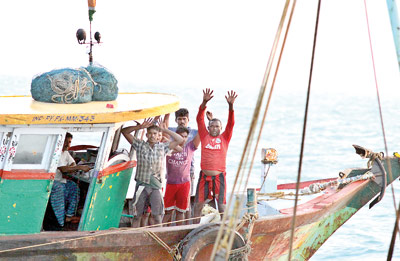
Caught: Indian poachers surrendering to the Sri Lanka Navy earlier this week
It is time for Sri Lanka to stand up boldly and tell the world that fishermen from Tamil Nadu, the southern state of India, are poaching its precious marine wealth.
Every week, we come across news reports about J. Jayalalithaa, chief minister of T’Nadu writing letters to Prime Minister Narendra Modi alleging that the Sri Lanka Navy (SLN) is harassing fishermen from her State, who fish in their “traditional waters” in the Palk Strait.
The other day, this writer happened to see a news item which has quoted Vijitha Herath, a Sri Lanka MP, as telling that the island nation loses $40 million every month due to illegal fishing (poaching) by Indian fishermen.
More than 50,000 families in the Northern District suffer silently because of this illegal, unregulated and unreported (IUU) fishing, Herath is reported to have said.
He has also said that this has become a multi-dimensional issue which is posing a threat to the national security of Sri Lanka.
Politicians in T’Nadu, irrespective of the parties to which they are attached, are unanimous in their attack on the island nation for the “cruelty meted out” to the poor fishermen, who they claim are ignorant about the existence of the International Maritime Boundary Line (IMBL) between India and Sri Lanka.
Apart from the number of T’Nadu fishermen and boats seized by the SLN, the government of India knows very well that the SLN and the Government of Sri Lanka (GoSL) are right, judicious and just.
The Government of India has told the Madras High Court which is hearing a petition against the former, alleging that no security was being provided to T’Nadu fishermen fishing in Palk Straits that, “There has never been an occasion in which any incident of Indian fishermen being attacked by the SLN in Indian waters, have been reported to the Indian Coastguard (ICG), either by the fishermen under attack, or by any shore authority to whom they would have passed such message”, said the Indian government affidavit filed in the Madras High Court.
The affidavit submitted by the Deputy Director General (Operations & Coastal Security), ICG, K.R. Nautiyal, to the Madras High Court, in a case related to a contempt petition filed by a Madurai based lawyer, states that the Indian fishermen not only poach in Sri Lankan territories, but are also “engaged in smuggling contrabands including drugs, due to the developing relationship with their counterparts in Sri Lanka and better monetary returns from such practices.”
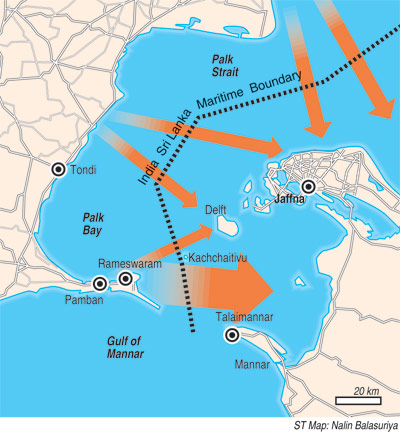
It is a charge sheet against the T’Nadu fishermen who violate the IMBL with impunity and scant regards for international law. It may be noted that Nautiyal’s affidavit/ statement is the official stance of the Indian government, prepared by senior legal officers of the central government. It states that, at no point of time has the SLN trespassed into Indian waters or attacked any fishermen inside Indian territory.
“Prior to the exchange of legal instruments of 1974 and 1976, the fishermen of both States carried out fishing on either side of the existing IMBL. These fishermen exploited the fisheries resources utlising only the traditional method.
However, the Indian fishermen, having found high commercial value shrimps and prawns in the Palk Bay area, also introduced trawling in the area.
Whereas, the Sri Lankan fishermen continued with their traditional method till the GoSL banned fishing at the peak of the civil war to prevent anti-State elements from masquerading as fishermen.
At the end of the civil war in 2009, these northern Sri Lankan fishermen restarted their traditional occupation of fishing. Further, due to environmental issues, all kinds of trawling was banned in the area, by the GoSL.
“Meanwhile, the Indian fishermen engaged in trawling also started crossing the IMBL into Sri Lankan waters for a better catch, as the fisheries resources were depleting on the Indian side due to over exploitation by an ever increasing number of Indian trawlers.
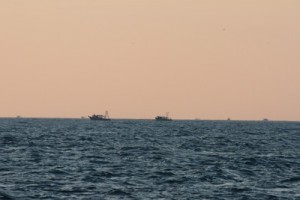 Further, these Indian fishermen are also reported to be operating with higher Horse Power (HP) engines than 30 HP motors, as stipulated under the Sri Lankan fisheries regulations.
Further, these Indian fishermen are also reported to be operating with higher Horse Power (HP) engines than 30 HP motors, as stipulated under the Sri Lankan fisheries regulations.
During their cross over into Sri Lankan waters, they have also reportedly damaged the fishing stakes and fishing nets of the Sri Lankan fishermen, due to the use of higher HP engines and larger boats,” states the ICG’s affidavit.
The affidavit further states that, in 2014 and 2015 (till March 31, 2015) 185 boats and 937 fishermen were apprehended by the SLN for poaching in Sri Lanka’s territorial waters despite SLN warnings.
According to data furnished by the ICG, 36,865 boats poached in Sri Lankan waters during the period January 2014 to March 2015.
The SLN has identified 1,474 boats from T’Nadu by their registration numbers. Interestingly, the ICG reveals that each and every seizure made by the SLN is instantly intimated to the Indian High Commission as well as the ICG.
“Details of IMBL crossings by Indian fishermen, received at the Indian High Commission, Colombo, are regularly forwarded to the T’Nadu government to initiate punitive action. However, IMBL crossings by the Indian fishermen still continue,” states the affidavit.
 The affidavit also has details of Community Interaction Programmes held by the ICG at various fishing hamlets along the T’Nadu coast, to create awareness among the fishermen community about the sanctity of the IMBL and the significance of respecting the sovereignty of other nations.
The affidavit also has details of Community Interaction Programmes held by the ICG at various fishing hamlets along the T’Nadu coast, to create awareness among the fishermen community about the sanctity of the IMBL and the significance of respecting the sovereignty of other nations.
“I respectfully state that, as per the emphasis indicated by Coastguard Act 30 of 1978, section 14(1), the primary duty of the ICG, as an Armed Force of the Union, is to protect by such measures, as it thinks fit, the maritime and other national interests of India in the maritime zones of India.
And under Section 14(2), the ICG provides protection and assistance to fishermen while in distress, provided such information is timely passed with a view to initiate quick response and render necessary timely assistance.
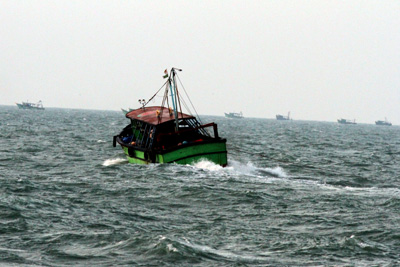 It is, however, submitted that, though the ICG and Indian Naval Ships regularly patrol the Indian side of the Palk Bay, there has never been an occasion in which any incident of Indian fishermen being attacked by the SLN in Indian waters, have been reported to the ICG, either by the fishermen under attack or by any shore authority to whom they would have passed such message, despite the fact that most of the fishing boats in T’Nadu are equipped with Global Positioning System (GPS) and VHF Radio communication sets.
It is, however, submitted that, though the ICG and Indian Naval Ships regularly patrol the Indian side of the Palk Bay, there has never been an occasion in which any incident of Indian fishermen being attacked by the SLN in Indian waters, have been reported to the ICG, either by the fishermen under attack or by any shore authority to whom they would have passed such message, despite the fact that most of the fishing boats in T’Nadu are equipped with Global Positioning System (GPS) and VHF Radio communication sets.
In addition, it is also pertinent to mention that the ICG, in liaison with Indian Space Research Organisation, Bangalore, have distributed over 280 Distress Alert Transmitters (DAT) to fishermen of T’Nadu, which includes 126 and 90 for Indian fishing boats operating in the Palk Bay and Gulf of Mannar, respectively.
The ICG has widely published its Emergency number 1554 for any distress at sea among the fishing community, during the Community Interaction Programmes. This Emergency number can be contacted by the fishermen through their mobile phones from their vessels, provided there is mobile connectivity.”
“It is observed that despite providing DATS and the availability of VHF, no distress calls were intimated through DATS or via VHF.”
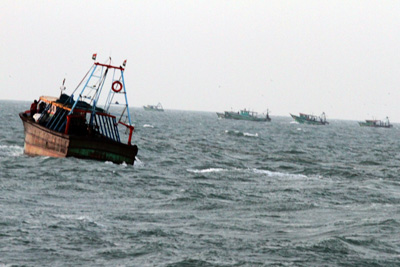 “All the distress reports were through information from relatives when the fishing vessels were overdue for their return. The affidavit has detailed the Search and Rescue operation coordinated by the ICG in the last two years as an appendix,” the ICG affidavit goes on to state.
“All the distress reports were through information from relatives when the fishing vessels were overdue for their return. The affidavit has detailed the Search and Rescue operation coordinated by the ICG in the last two years as an appendix,” the ICG affidavit goes on to state.
Another affidavit submitted by Deputy Secretary (Sri Lanka), Ministry of External Affairs, Government of India, Prafullachandra Sharma, states that all “averments made by the petitioner in his petition are incorrect, not based on any positive authenticated and proved facts, but based on media reports, assumptions and devoid of any legality.”
A former Captain of the Indian Navy told this writer that the SLN would never attack any Indian fishermen in Indian waters. “Both Navies share brotherly relations. Most of us were trained together and know each other personally. The SLN would never trespass into our territory.”
Another important point to be noted is that the advisories issued to Indian fishermen by Indian National Centre for Ocean Information Services (INCOIS), a Hyderabad based elite research laboratory under the Government of India.
Scientists of INCOIS have developed two state-of-the-art technologies with special focus on fishermen. With the real time “state of the ocean” data collected through buoys and Indian remote sensing satellites, they locate potential fishing zones (PFZ) in Indian territories and alert the fishermen.
The fishermen need not waste time searching for fish. Details like the exact location from where they could get a rich catch are intimated to the fishermen through village resources centres along the Indian coast.
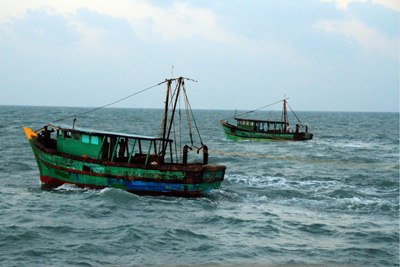 The INCOIS in association with Chennai-based MS Swaminathan Research Foundation (MSSRF) has yet another innovation to alert the fishermen when they approach the IMBL between India and Sri Lanka.
The INCOIS in association with Chennai-based MS Swaminathan Research Foundation (MSSRF) has yet another innovation to alert the fishermen when they approach the IMBL between India and Sri Lanka.
The GPS installed in the fishing boats and the hand phones carried by the fishermen give warning alarms when they approach the IMBL. The closer they get to the IMBL, the louder the alarm becomes.
But our ingenious fishermen switch off their mobiles as well as the GPS when they approach the IMBL! This was told by none other than a senior INCOIS scientist.
It is time the fishermen of T’Nadu learnt to respect international laws.
| T’Nadu fishermen are bait for smuggling cartels It is an open secret in T’Nadu that the fishing boats/trawlers trespassing into Sri Lankan waters, belong to a group of powerful politicians and businessmen, and the fishermen, drawn from the districts of Ramanathapuram, Nagapattinam, Pudukottai and Kanyakumari, are mere pawns employed by them.Each trawler costs at least Indian Rs 6 million. The fishermen living in hamlets along the east coast belong to the poor sections of society. What is equally important is the number of gold/jewellery showrooms in Ramanathapuram district, owned by the major gold merchants in South India.One has to read this together with the high quantity gold smuggling taking place in the small stretch of sea between the two countries. There are frequent reports of gold seizures by the Revenue Intelligence Dept from the airports at Madurai, Tiruchi and Chennai from passengers arriving from Colombo and Singapore. When Dr Subramanian Swamy, noted economist and senior BJP leader, said the fishing boats seized by the SLN belonged to certain senior political leaders of the AIADMK and the DMK, all hell broke loose in T’Nadu. Though he did not name anybody, many politicians went on record to refute the charge made by Dr Swamy, who is also a former union minister for Law, Justice and Corporate affairs. Interestingly, many fishermen from T’Nadu, especially those hailing from the southern districts of Ramanathapuram and Kanyakumari, have been arrested by the Navies of Saudi Arabia, Iran and Qatar for unauthorised fishing in their territorial waters. The International Fishermen Development Trust, a Kanyakumari-based organisation, claiming to represent fishermen community, always sends representations to the Union Government at New Delhi to intervene and save the lives of T’Nadu fishermen arrested by the Navies of these countries. |

